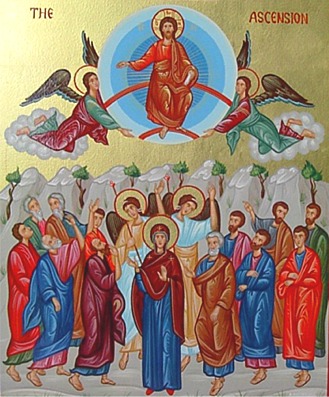In those days a decree went out from Emperor Augustus that all the world should be registered…
These words open one of the best known stories on this planet, the story of Jesus’ birth, the story of Christmas. It is a story that most of us probably heard first when we were children, a story we have heard many, many times, a story we like to hear again, and again, and again – ‘Alle Jahre wieder’, as the popular German Christmas carol says.
God comes into this world as an infant, a vulnerable human being. God comes into the midst of times that are uneasy and tense, into a place where people yearn for freedom, for justice, for peace. God comes into this world, even though there apparently is no room for him. Yet Got cannot be stopped or deterred. God is born, and angels announce his birth and sing for joy, and shepherds, after they get over the initial shock of seeing angels, can’t contain themselves and have to spread this amazing story everywhere. God is born! God is among us! God is with us! That’s great news! Heaven has come to earth. Freedom and justice and peace and goodwill for all will follow.
And in the midst of this amazing and action packed story, we have Mary. How often have we heard the story, but how often have we actually paid attention to the words, ‘But Mary treasured all these words and pondered them in her heart’? Why does Luke write this down? What does it add to the story?
Now I think the words that are used in the original Greek of Luke’s gospel for ‘treasure’ and ‘ponder’ are quite fascinating. What is translated as ‘treasure’ is actually holding fast, protecting, defending. These words, spoken by the angel and the heavenly host and spread by the shepherds, mean everything to Mary. After all, this was her agreement with God, to bear this child who would turn this world around by bringing a glimpse of heaven to earth. Just last week, we heard Mary’s powerful fight song, the ‘Magnificat’. Mary knows what is at stake. And she’s all in. Yes, she holds on fast to those words, the message of salvation and redemption for all.
The Greek word that is translated as ‘pondering’ actually means throwing together, moving things about. So Mary is not only quietly pondering the angelic message, she wrestles with it in her heart. These words are too important not to be wrestled with. What do they mean for a society, for a world, that waits for liberation and justice? What do they mean for us and how we live in this world?
Now we all know what it means to hold on fast to certain words, ideas, ideals. Most of us feel very strongly about things, we have our opinions, we have our ethics, our morals, our values, our beliefs. And these days, it’s so easy to share them – quite literally, on media like Twitter and Facebook and all those platforms that my kids use, because they know how to.
However, I sometimes wonder if we still practice the art of pondering, the art of wrestling with things we hear, enough. I’m a Facebook addict, I admit it, and I appreciate many things and stories people share. But I also see that people are incited too easily and react very quickly. Like, love, sadness, anger, astonishment– you can express your opinion with the simple click of a button. And if we get really involved, we enthusiastically react when we read “type ‘Amen’ if you agree that…’ – you fill in the gap. No pondering necessary, no wrestling with words or stories required.
And of course most media these days is set up to provoke quick reactions. Op ed pieces outnumber solid journalistic research by far. Most news stories are meant to hit you in the limbic system of your brain, the part that is also often referred to as the ‘lizard brain’ – this is the part of the brain that registers fear and provokes fight or flight reactions – but not so much that part of the brain that enables us to reason and discern. It’s all about getting attention, fast, and so many news pieces are sensationalist. That’s our world. And we get easily lured into that. But as we all know, nowadays there are a lot of stories out there that are not entirely true, that don’t tell the whole story. We got to be careful and mindful. We need to weigh what we hear, we have to ponder.
Pope Francis, with whom I don’t agree on everything, but who says and does many things that I find very relatable, just last week admonished a group of Italian journalists to avoid the ‘Sins of Communication’. I think this is brilliant – the sins of communication.
Pope Francis said that in a field “dominated by the anxiety of speed, by the drive for sensationalism,” reliable information is at a premium.
“There is an urgent need for reliable information, with verified data and news, which does not aim to amaze and excite, but rather to make readers develop a healthy critical sense, enabling them to ask themselves appropriate questions and reach justified conclusions. There is an urgent need for news communicated with serenity, precision and completeness, with a calm language, so as to favour a fruitful reflection; carefully weighted and clear words, which reject the inflation of allusive, strident and ambiguous speech.”
That quite a mouthful but I think we get it: journalism, the news, media should give us solid information and invite us to ponder – to wrestle – to think for ourselves and to come to our own conclusions. And, by the way, Pope Francis in that sense is a follower of Martin Luther, for whom education for all was immensely important. Luther wanted all people to read and think for themselves and come to conclusions. Luther encouraged critical thinking. Wrestling. Pondering.
And this leads us back to Mary. She’s at the heart of the Christmas story, the bearer of Christ, the co-conspirator and cooperator in God’s daring plan for all the world. She doesn’t just swallow the message of the angels, which is then shared with the world by the shepherds – she wrestles with them in her heart. These words are too important not to be wrestled with. And here Mary is the link to us. Why does Luke add this mysterious sentence, that Mary treasured all these words and pondered them in her heart? I think it is because we are invited to ponder. What do these words, what story of Christmas, what does the angelic message mean for a society, for a world, that waits for liberation and justice and healing and peace? What do they mean for us and how we live in this world? What does the beloved story of Christmas, what does the message of Christmas do with us?
First and foremost it is a story and a message that gives us hope and joy: God is with us and among us. God chose to share in our human experience. God can relate to us. And God wants the redemption and salvation of all creation. That’s great news!
But at the same time this story invites us to live the hope and joy where we are. To see Christ, not only in the manger, but in all those inhospitable and unexpected places and situations in our life. To strive for peace and justice and goodwill in a world that all to often is restless, uncertain, afraid, unjust and hostile. To bring light into the darkness. To become co-conspirators and cooperators of God ourselves. And to never stop pondering and wrestling: what does it look like when heaven comes to earth?
Yes, today, we experience how heaven and earth touch in the babe in the manger. May we carry the mystery of Christmas into all the days of our lives, for the glory of God in the highest – and the sake of all creation.
Photo by Leandro Cesar Santana on Unsplash






